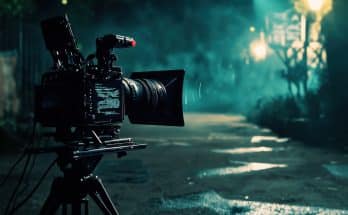We caught up with actor and producer Jonathan Stoddard, between filming, for candid conversation about his professional and personal journey.
Call it manifesting, emotional goal setting, praying, or whatever you’d like. Get clear on what you want and what you want to experience then connect yourself to that outcome, and learn how to influence yourself to stay committed to it.

We caught up with actor and producer Jonathan Stoddard in Canada, between filming, and had a candid conversation about his professional and personal journey.
Jonathan Stoddard – Early Experiences

Can you share a little about your early experiences in theatre and how they shaped your passion for acting?
As a kid, the theatre was a place of emotional freedom; a place where I could experiment, be loud, play with others, and get rewarded for it. I’m sure at the time, my parents thought it was a good way to keep me busy during the summers and after school, meanwhile, I was falling in love with performance art and the study of humanity.
Fast forward through high school, where I landed roles like Tony in “West Side Story” and “The Emcee” in Cabaret, the stage had become a part of me. There’s something so visceral about using my entire body to express an emotion and to translate that feeling to the audience – there’s nothing quite like it. To me, the stage becomes my home. It didn’t matter what state I was in; if I was on stage, I felt alive and ultimately became the driving force for me choosing it as a career.
Buy Print Magazine – Worldwide
Jonathan Stoddard – Challenges
What were some of the challenges you faced when transitioning from stage performances to film and television?
It was really challenging to transition from stage to film and television. I thought emotion was emotion…right? Feeling and expressing it for an audience would translate to a TV screen. I took workshops and classes here and there when I finally moved to LA. I did everything I could to ‘try to break in’ to Hollywood…with absolutely ZERO luck. All I knew was that I was being authentic! I was being real! I was giving it everything I had! Why weren’t they casting me?? Part of the problem was that all the classes I was taking further reinforced that I should follow my instincts and trust my emotions…little did I know that this was the problem, not the solution.
Emotions are developed, and instincts are trained. If you don’t have an understanding of the frame, your instincts will work against you 9 out of 10 times. I didn’t get this until I read this one book, and even though I wasn’t much of a reader, this book changed my life: ‘ Secrets of Screen Acting’ by Patrick Tucker. This book showed me the relationship between the lens and the emotion. It taught me to refine my craft and appreciate all the other factors in film and television that help convey emotion. And even though I still have so much more to learn, it taught me that acting isn’t always about what I feel, but about what the viewer feels when they watch the performance, hear the music, and see how the story unfolds. It changed everything for me.
Jonathan Stoddard – Podcast
In the first episode of our “Cypher podcast” where we interview actors, we catch up with Jonathan for a conversation about his journey.
As Jonathan moved from the intimate confines of the theatre to the broader canvas of screen acting, his drive for the craft only continued to blossom. In recent years, he has emerged as a notable talent in both film and television, skilfully navigating a diverse array of genres. From light-hearted romantic comedies that charm viewers to gripping dramas that challenge emotional limits, his versatility shines through. What truly sets him apart is his unique ability to convey subtle vulnerabilities: each character he embodies serves as a reminder of his commitment to this art. Stoddard’s performances resonate deeply, leaving audiences intrigued and moved, often prompting them to reflect on their own emotions and experiences.
California
How did growing up in San Rafael, California, influence your artistic development and career choices?
I loved growing up in San Rafael. I was close enough to the city while still being far enough away. Surrounded by incredible cities of artistic expression, I had San Francisco, Berkeley, Oakland and Marin Shakespeare Company all within a 30-minute drive.
My parents always insisted that we explore the arts, so we’d go to operas and musical theatre shows and more growing up. I used to sit there and marvel at their performances, and I still think about them today.
Impact
Which role or performance in your early career had the most significant impact on you, and why?
On stage, The Emcee in Cabaret was the most impactful performance because I could freely break gender norms, which was quite entertaining when I transitioned from Varsity Football to the stage. I loved the dichotomy of it all. The ability to play without judgment of ‘that’s not manly enough’ or ‘real guys don’t do that’. I’ve always had an affinity for going against the norm, and The Emcee gave me permission to do that.
On camera, it was when I booked Young John Abbott in The Young and The Restless. This booking was my first major network booking, and my agent printed out the email offer, and I still have it to this day. It started out as under five lines and continued on for 3 years. This booking was so powerful for me because I was finally a part of television history, a Legendary show with huge shoes to fill. All my insecurities and doubts flooded my mind and body, and I had to find a way through the dark and do it anyway. This booking changed my life and taught me so many life skills that I still cherish today.
Important Quality
What do you believe is the most important quality an actor should possess?
Just one!? I have to give at least two: creativity and Teamwork. Creativity is the craft within, the curious drive to explore something new and then the desire to make something out of nothing. Teamwork is the craft outside of ourselves, compassion and awareness of others, a drive to be on point so that we can make other people’s jobs easier, and to always remember that a movie is made by many people working together. Master these and you’ll always work in this industry.
Can you describe your process when preparing for a new role? How do you connect with your character?
Know the material. Inside and out, know the material. Being able to perform moving and being able to perform the same scene sitting still staring at a singular object in your room. Connecting with the character needs to be as easy as tying your shoes, and the words need to be familiar in your mouth. I do this by reading it over and over, journaling about my character, breaking down the script to understand what I’m responding and reacting to and frequently, I’ll put a pen in my mouth while I say the words. This is kind of like yoga for the mouth. If you can say the words with something in your mouth, chances are you can say them easily without the pen. Once I dial this in, the emotions present themselves.
Favourite Project
What has been your favourite project to work on so far, and what made it special for you?
One of my favourite projects is a movie called A Prince and Pauper Christmas, where I played two characters. Granted, it’s just a fun Christmas movie, but this took my acting on an entirely new adventure. I love the technical side of the craft, from delivery to camera angles to blocking, etc. Playing two characters meant twice the work and tons of prep to plan out the scenes before we shot them, so that I knew what my other character was going to do and where they would be before we shot the scene.
Playing Characters
How do you approach playing characters with deep emotional vulnerability?
For me, deep emotional vulnerability is stillness, compassion and presence. It’s hard to feel for someone when they are thrashing around or super active, but once they settle down, when you can see the chaos, pain or conflict in their eyes, that’s when the audience feels it too. During those types of scenes, I fight every urge to move and fixate on a single point and allow the emotions to take me like a storm.
Jonathan Stoddard – Advice
What advice would you give to aspiring actors who look up to you and want to follow in your footsteps?
The greatest advice I can give is to study 4 things: The Craft of Acting, Manifesting, Tony Robbins, and Marketing. Master these and you will be successful.
The Craft of Acting: Study the greats from teachers to actors, both classic and modern. Don’t try to reinvent the wheel. Learn from Oscar winners and nominees of the past and try to recreate your favourite scenes. In doing so, you will discover the secrets of acting.
Jonathan Stoddard – Manifesting
Call it manifesting, or emotional goal setting, or praying, or whatever you’d like, but get clear on what you want and what you want to experience and connect yourself to that outcome, and learn how to influence yourself to stay committed to the outcome.
Tony Robbins: His work is unparalleled in human development and understanding what drives all of us to do what we do, which is the basis of acting. Understand a character’s motives, and you understand the character. Understand yourself and you will understand the universe.
Marketing
This is a business, and I thought about just saying study business, but I think marketing is more specific and powerful for today’s world. You can be the most talented person in the world, and it won’t matter if nobody knows who you are. Study marketing, and they won’t be able to ignore you.
Hollywood
How do you stay grounded and connected to your roots in a fast-paced industry like Hollywood?
I created something called a Me Book that I still look at today. It’s a collection of who I am at my core. From poems, to names of family members and inspirational figures, to mindset beliefs, and more. I encourage every actor to create a Me Book and read it every day, so that you never forget who you are while you’re being someone else.
Jonathan Stoddard – Roles
Are there any specific genres or types of roles you haven’t yet explored but would like to in the future?
There’s still so much more I’d love to explore in the way of genres and characters. I think what I’m most excited about is working with The Greats and the Creative Minds of the future. It’s the journey of making a movie and building that set-family that really excites me.
Performances
How do you keep your performances fresh and engaging for both yourself and your audience?
It may sound simple, but Presence. It’s easier said than done when things are falling apart around in both positive and negative ways. The attention can be disarming, and the drama of real life can be debilitating. As long as you’re present, in the moment, with your co-star, director and team, the performances will always be fresh and exciting.
Collaboration
What role does collaboration play in your work with directors and fellow actors?
Collaboration and Flexibility are everything to me. I always walk on set with ideas and an intention to capture the intent of the scene beyond just the words, and I think that’s why people hire us. To bring something off the page and make it our own, but being flexible enough to live within the boundaries of the frame and time constraints of the day.
Everyone wants the movie to do well, so I treat everyone with respect on set and make sure they know I’m grateful they are there.
Credits
Website cover photography: Peter Konerko ©
Join us on Spotify.
Contact the magazine.




